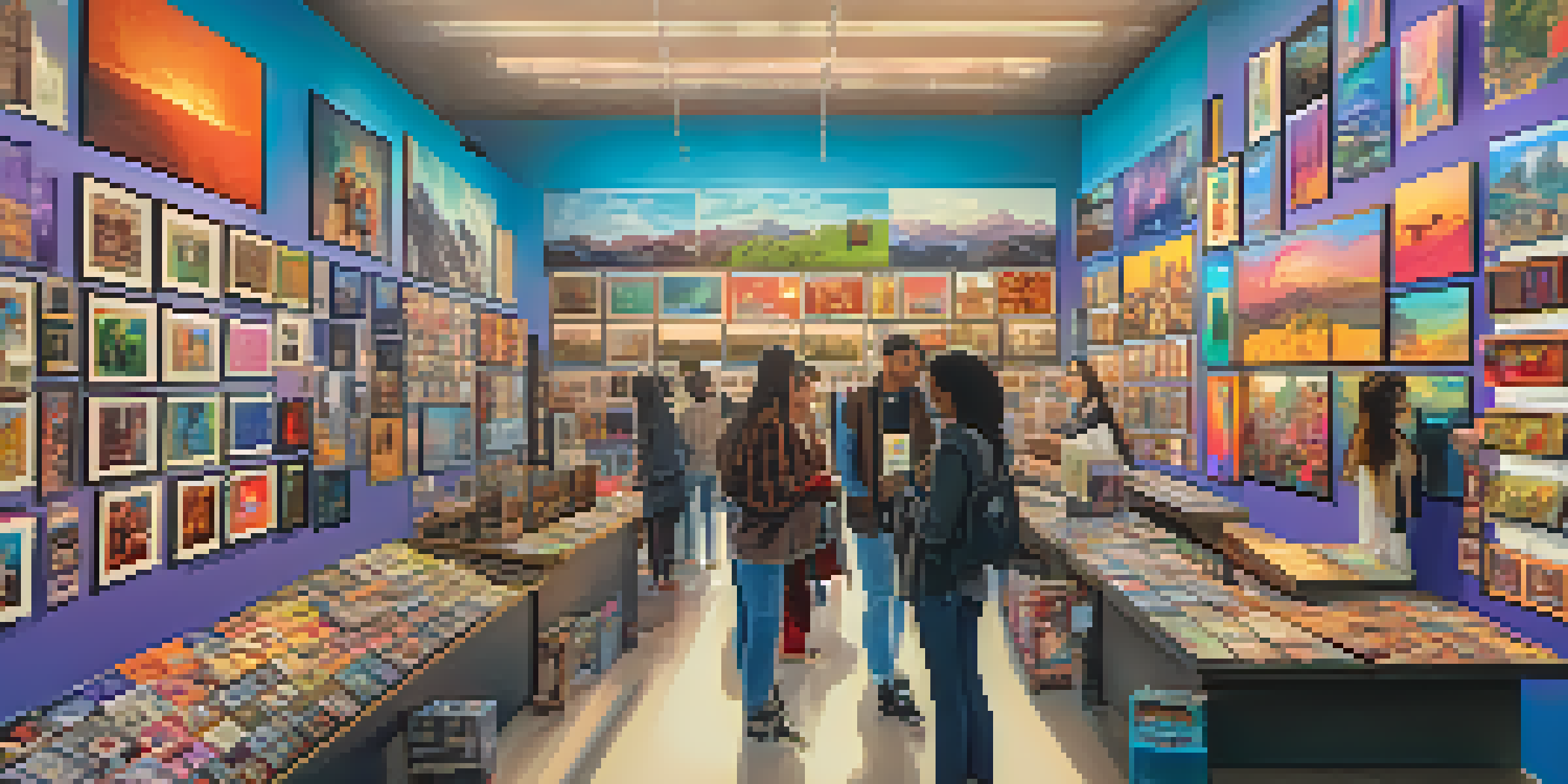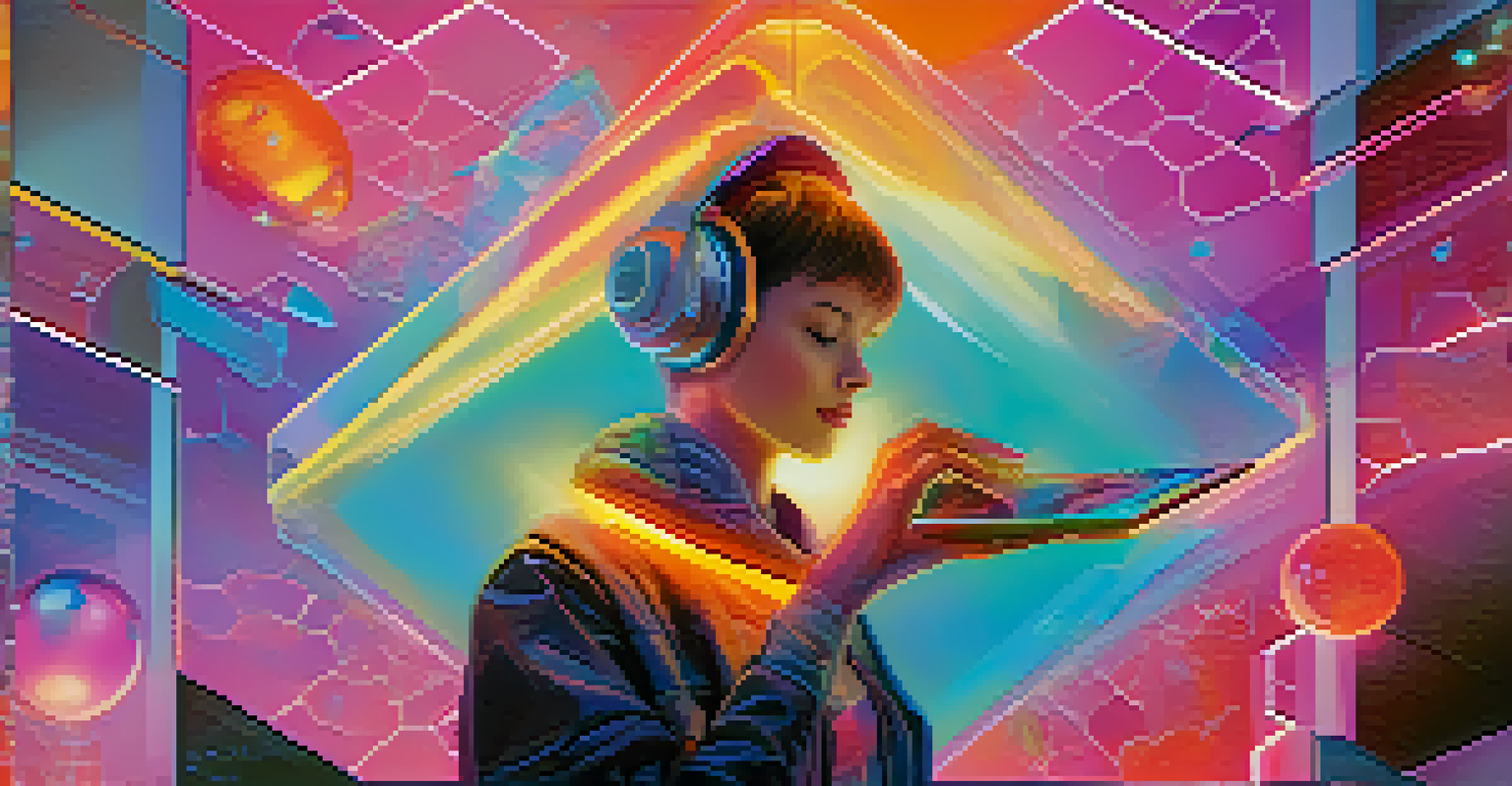How NFTs Are Shaping the Future of Digital Content Ownership

Understanding NFTs: A New Digital Asset Class
NFTs, or non-fungible tokens, are unique digital assets that represent ownership of a specific item or piece of content. Unlike cryptocurrencies such as Bitcoin, which are interchangeable, each NFT has distinct information that makes it one-of-a-kind. This uniqueness is what allows artists, musicians, and content creators to sell their work in a way that was not possible before.
The future is already here – it's just not evenly distributed.
Think of NFTs like owning an original painting versus a print; the original holds more value because of its scarcity and the story behind it. NFTs give digital creators that same sense of ownership and provenance. This shift is encouraging more artists and creators to explore digital mediums and monetize their work effectively.
As NFTs continue to gain momentum, they open up new avenues for creators to connect with their audiences. By leveraging blockchain technology, NFTs ensure transparency and security, making it easier for buyers to trust that they are purchasing genuine content from the original creator.
Empowering Creators Through Direct Sales
One of the most exciting aspects of NFTs is how they empower creators to sell their work directly to consumers. Traditionally, artists often relied on galleries or intermediaries to showcase and sell their art, which could dilute their profits. With NFTs, creators can bypass these middlemen and earn a larger share of the sales, allowing them to sustain their work more effectively.

This direct-to-consumer model fosters a deeper connection between creators and their fans. For instance, musicians can sell exclusive tracks or concert tickets as NFTs, offering fans a unique experience that traditional sales channels can't provide. This not only enhances the fan experience but also builds a loyal community around the creator.
NFTs Empower Direct Sales for Creators
NFTs allow artists to sell their work directly to fans, enhancing profits and building stronger connections.
Moreover, NFTs can incorporate smart contracts, which automatically ensure that artists receive a percentage of future sales whenever their work is resold. This means that creators can continue to benefit from their work long after the initial sale, creating a sustainable income stream.
Redefining Ownership in the Digital Age
NFTs are challenging our traditional understanding of ownership in the digital realm. In a world where copying digital files is as easy as clicking a button, NFTs provide a way to prove that you own an original piece. This concept is revolutionary, as it allows digital art, music, and even virtual real estate to be treated as unique assets.
Digital ownership is the essence of the NFT revolution.
Imagine owning a rare digital collectible, like a virtual trading card, that no one else can claim as theirs. This sense of ownership can add significant value to digital items, which were once considered easily replicable and therefore worthless. Fans are now willing to pay premium prices for original digital work, just as they would for a physical piece.
As society shifts toward more digital interactions, redefining ownership is essential. NFTs are laying the groundwork for a future where digital assets are taken as seriously as physical goods, paving the way for new business models and economies.
The Role of Marketplaces in NFT Growth
NFT marketplaces have emerged as critical players in the success of this digital ownership revolution. Platforms like OpenSea, Rarible, and Foundation provide spaces where creators can showcase their NFTs and buyers can easily browse and purchase unique digital items. These marketplaces are essential for building a vibrant ecosystem around NFTs.
The user-friendly interfaces of these platforms make it easy for newcomers to explore and engage with NFTs. With various categories ranging from digital art to music and virtual reality assets, there’s something for everyone. This accessibility is crucial in attracting a broader audience beyond just tech-savvy individuals.
Redefining Digital Ownership
NFTs provide a way to prove ownership of unique digital assets, challenging traditional perceptions of digital content.
Additionally, marketplaces often facilitate community engagement through features like auctions and limited-time drops, creating excitement and urgency around NFT purchases. As more people become aware of NFTs, the role of these marketplaces will only continue to grow, solidifying their importance in the digital content landscape.
Challenges and Criticisms Facing NFTs
While NFTs have garnered immense popularity, they are not without their challenges and criticisms. One of the most significant concerns revolves around the environmental impact associated with blockchain technology. The energy consumption required for minting and trading NFTs can be quite high, raising questions about sustainability in an era increasingly focused on eco-friendliness.
Moreover, the NFT space has faced issues with copyright infringement, where individuals mint and sell digital content they do not own. This has sparked debates about intellectual property rights and the need for clearer regulations to protect artists and creators. As the market continues to mature, finding solutions to these challenges will be essential for its long-term viability.
Despite these criticisms, many industry advocates are actively working towards more sustainable practices and clearer legal frameworks. The conversation around NFTs is evolving, and with it, the potential for positive change in how digital content is created, shared, and owned.
NFTs and the Evolution of Digital Communities
NFTs are not just reshaping ownership; they are also transforming how digital communities interact. By creating unique digital assets, fans can support their favorite creators and become part of a shared experience. This has led to the emergence of exclusive communities where NFT holders can connect, collaborate, and engage with each other and the creators themselves.
For instance, many NFT projects offer exclusive access to events, behind-the-scenes content, or even direct communication with creators. This sense of belonging fosters loyalty and encourages fans to invest not just financially, but also emotionally in the work they love. It’s a community-driven approach that enhances the overall experience of digital content consumption.
Marketplaces Drive NFT Ecosystem Growth
NFT marketplaces facilitate the buying and selling of unique digital items, making it accessible for a broader audience.
As these communities continue to grow, they will play a crucial role in the future of digital content ownership. By fostering collaboration and interaction, NFTs are creating a vibrant ecosystem where creators and fans can thrive together.
Looking Ahead: The Future of NFTs and Digital Ownership
As we look to the future, the potential for NFTs to reshape digital content ownership is immense. With ongoing advancements in technology and increasing acceptance among mainstream audiences, NFTs could become a staple in how we buy, sell, and interact with digital assets. This evolution will likely open doors for new industries and business models we can't yet imagine.
Moreover, as more creators embrace NFTs, we can expect a surge in innovative uses for this technology. From virtual fashion to digital real estate, the possibilities are virtually limitless. As society becomes more comfortable with digital ownership, we may see NFTs integrated into everyday transactions and experiences.

Ultimately, the journey of NFTs is just beginning. By empowering creators, redefining ownership, and fostering community engagement, NFTs are set to leave a lasting impact on the landscape of digital content ownership, paving the way for a more inclusive and dynamic future.